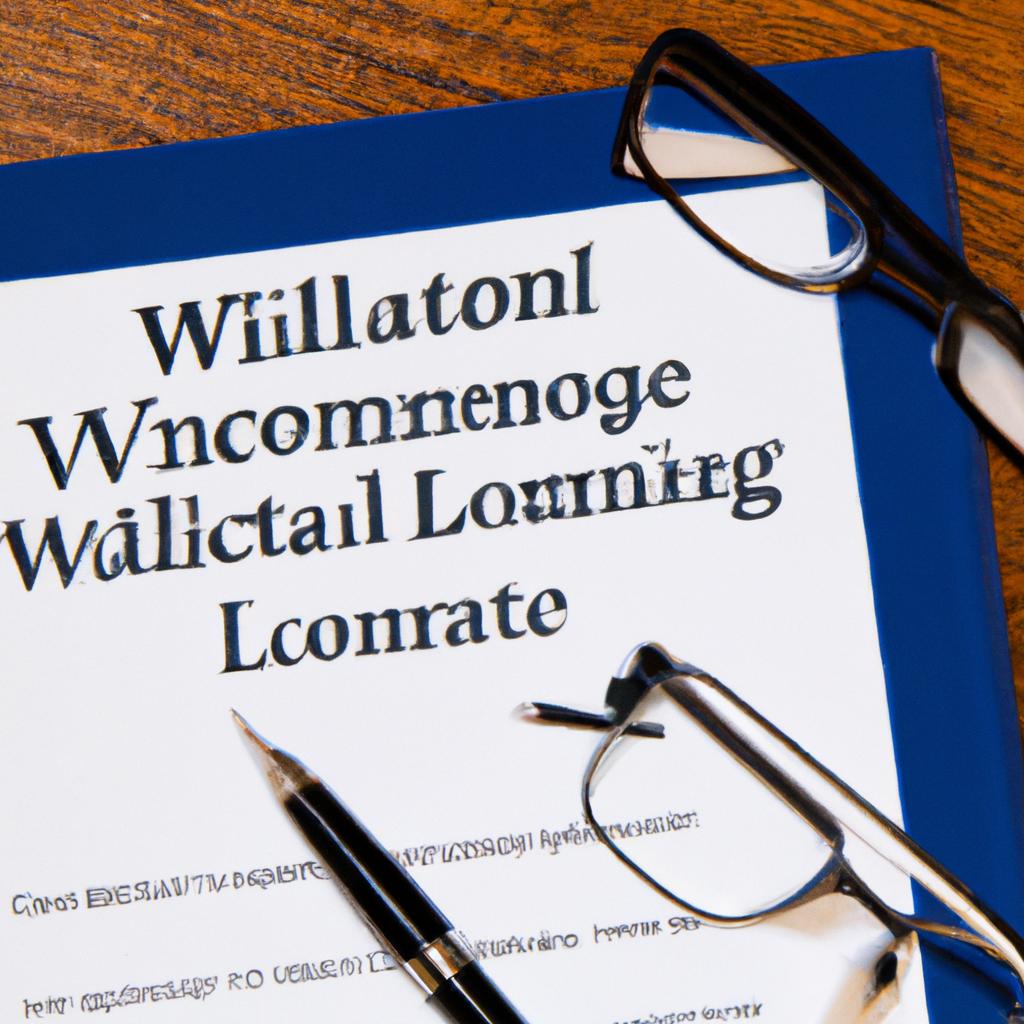Navigating the complexities of probate and estate planning can be a daunting task, especially when it comes to altering a last will and testament. The question on many individuals’ minds is whether or not it is possible to change a will without the assistance of a lawyer. In this article, we will explore the legal guidelines surrounding this issue and provide valuable insights on how to proceed with modifying a will without professional legal counsel. As experts in estate planning, probate, elder law, Wills, and trusts, at Morgan Legal Group in New York City, we understand the importance of ensuring your wishes are accurately reflected in your will.
Understanding the Legal Requirements for Amending a Will Independently
When considering amending a will independently, it is crucial to understand the legal requirements that must be followed to ensure the validity of the changes. While it is possible to make changes to a will without the assistance of a lawyer, it is important to proceed with caution to avoid any potential issues or challenges that may arise in the future.
One key legal requirement for amending a will independently is ensuring that the changes are made in accordance with state laws. Each state has specific laws governing the amendment of wills, so it is essential to familiarize oneself with the requirements in the relevant jurisdiction. Additionally, it is important to clearly document any changes, whether through a codicil or by completely rewriting the will, to ensure that the intentions of the testator are accurately reflected.

Potential Risks and Consequences of DIY Will Modifications
When considering making modifications to a will without the guidance of a lawyer, there are several potential risks and consequences to be aware of. One significant risk is the possibility of making a mistake in the modification process, which can lead to invalid clauses or contradictions within the document. This could result in confusion and disputes among beneficiaries after the testator’s passing, ultimately leading to lengthy and costly legal battles.
Another consequence of DIY will modifications is the increased likelihood of overlooking important legal requirements. Without the expertise of a lawyer, individuals may inadvertently fail to comply with state-specific laws or regulations, rendering the modified will legally invalid. Additionally, DIY modifications may not adequately address complex family dynamics or financial situations, potentially leaving loved ones unprotected or disinherited. It is crucial to seek professional legal advice to ensure that any changes to a will are executed correctly and in accordance with applicable laws.

Recommended Steps for Safely Making Changes to a Will without Legal Counsel
When considering making changes to your will without the guidance of legal counsel, it is important to proceed with caution. While it is possible to update your will on your own, it is crucial to follow recommended steps to ensure the changes are valid and legally enforceable.
<p>Here are some recommended steps to safely make changes to your will without legal counsel:</p>
<ul>
<li><strong>Review your current will:</strong> Before making any changes, carefully review your existing will to determine which provisions you wish to update or amend.</li>
<li><strong>Use a codicil:</strong> Instead of creating a new will from scratch, consider adding a codicil to your existing will to make the desired changes. A codicil is a legal document that allows you to modify specific provisions of your will without rewriting the entire document.</li>
<li><strong>Sign the changes properly:</strong> Ensure that any changes or additions to your will are signed and witnessed according to state laws to make them legally binding.</li>
<li><strong>Store your updated will securely:</strong> Once you have made the necessary changes, store your updated will in a safe and secure location, such as a safe deposit box or with an attorney, to prevent it from being lost or tampered with.</li>
</ul>
Consulting with an Estate Planning Attorney for Complex Revisions and Guidance
When it comes to making complex revisions to your will or seeking guidance on estate planning matters, consulting with an experienced estate planning attorney is highly recommended. While some individuals may attempt to change a will without the assistance of a lawyer, doing so can lead to costly mistakes and potential legal challenges in the future. A qualified attorney can provide the necessary expertise and guidance to ensure that your wishes are accurately reflected in your estate planning documents.
During a consultation with an estate planning attorney, you can discuss the specifics of your situation and receive personalized advice on the best course of action. From updating beneficiaries to establishing a trust, an attorney can help you navigate the complexities of estate planning and ensure that your assets are protected for future generations. By working with a knowledgeable attorney, you can have peace of mind knowing that your estate plan is in compliance with state laws and accurately reflects your wishes.
Q&A
Q: Can I change my will without hiring a lawyer?
A: Yes, you can make certain changes to your will without the help of a lawyer.
Q: What changes can I make without a lawyer?
A: You can typically make minor changes such as updating beneficiaries or changing details about your assets. However, more complex changes may require legal guidance.
Q: How do I go about changing my will without a lawyer?
A: You can create a codicil, which is a legal document that amends your existing will. It is important to follow proper procedures to ensure the changes are legally valid.
Q: Are there any risks to changing a will without a lawyer?
A: Yes, there is a risk that the changes may not be legally valid if they are not done correctly. This could lead to challenges to the will in the future.
Q: When should I consider hiring a lawyer to change my will?
A: It is recommended to hire a lawyer if you are making significant changes to your will, have complex estate planning needs, or if you are unsure about the legal requirements for updating your will.
The Conclusion
In conclusion, while it is possible to change a will without the assistance of a lawyer, it is important to proceed with caution and ensure that the necessary legal requirements are met. Consulting with a legal professional can provide invaluable guidance and ensure that your wishes are properly and legally documented. Remember, a will is a crucial document that dictates how your assets and belongings will be distributed after your passing, so it is essential to approach any changes with care and diligence. Ultimately, the decision to change a will without a lawyer is a personal one, but seeking professional advice can help to navigate the complex legal landscape and provide peace of mind for you and your loved ones.
 Can You Change a Will Without a Lawyer?
Can You Change a Will Without a Lawyer?
Planning for the future is essential for anyone, and a will is a crucial part of that plan. It outlines how we want our assets to be distributed after our passing, ensuring that our loved ones are taken care of and our final wishes are honored. However, sometimes changes may need to be made to a will, whether due to changes in circumstances or a change of heart. This begs the question, can you change a will without a lawyer? In this article, we will provide a comprehensive answer to this question and explore its implications.
Before addressing the main question, let’s first understand the function of a will and the options available for making changes to it.
The Purpose of a Will
A will, also known as a last will and testament, is a legal document that outlines how a person’s assets and possessions will be distributed after their death. It also allows them to name an executor who will be responsible for carrying out their wishes and managing their estate. Additionally, a will can specify who will take care of any minor children left behind and outline any funeral or burial preferences.
Without a valid will in place, your assets will be distributed according to state laws, which may not align with your wishes. This is why having a will is vital for ensuring that your loved ones are taken care of and your assets are distributed as per your wishes.
Options for Changing a Will
Life is constantly changing, and what may have seemed like the right decision at the time of writing the will, may no longer be applicable. This is why it is essential to review and update your will periodically to reflect any changes in your life. Fortunately, there are a few options available for making changes to a will, including:
1. Writing a new will – This option involves creating an entirely new will that revokes the previous one in its entirety. It is a suitable course of action if you want to make significant changes to your will.
2. Adding a codicil – A codicil is a legal document that amends specific provisions in a will without invalidating the entire document. However, it must be executed with the same formalities as a will, and it is not suitable for making significant changes.
3. Creating a revocable living trust – A living trust allows you to place your assets into a trust fund while you are still alive, and they will be distributed according to your wishes after your death. This option also allows for making changes to the trust during your lifetime.
Can You Change a Will Without a Lawyer?
Now that we understand the purpose of a will and the options for changing it, let’s address the main question – can you change a will without a lawyer?
The short answer is yes, you can change a will without a lawyer. However, it is not recommended, and there are some potential risks and challenges to consider.
The Risks and Challenges of Changing a Will Without a Lawyer
By attempting to change a will without a lawyer, you risk making errors or not following the legal requirements, which may result in your changes being invalid. This means that your will may not reflect your true wishes after your passing, and this can cause conflicts and legal disputes among your loved ones. Furthermore, without a lawyer’s guidance, you may also miss important updates or changes in the law that may affect your will.
Another challenge is the emotional aspect of changing a will. Making changes to a will can sometimes be emotionally challenging, and having a lawyer to guide you through the process can provide support and a professional perspective.
The Benefits and Practical Tips for Changing a Will With a Lawyer
While it may be possible to change a will without a lawyer, the benefits of seeking legal counsel during this process should not be overlooked. Here are some practical tips for making changes to a will with a lawyer:
1. Seek professional legal advice – A lawyer can provide you with the necessary guidance and knowledge to make informed decisions when changing your will.
2. Be clear and specific – When making changes to a will, it is crucial to be clear and specific to avoid any misunderstandings or conflicts in the future.
3. Keep your will updated – Life changes constantly, and it is essential to review and update your will as needed. Working with a lawyer can help ensure that your will remains valid and aligned with your wishes.
Real-Life Experience
To further illustrate the importance of seeking legal counsel when changing a will, let’s look at a real-life experience. Sarah, a woman in her 60s, decided to change her will after getting remarried. She wanted to update her beneficiaries and include her new husband in her will. However, she was unaware of the legal requirements and ended up invalidating her entire will, causing disputes among her children and new husband. With the help of a lawyer, Sarah was able to rectify the situation and create a new valid will.
Conclusion
In conclusion, a will is a crucial document for ensuring that your assets are distributed according to your wishes after your passing. While it is technically possible to change a will without a lawyer, it is not recommended. Working with a lawyer during this process can provide guidance, support, and ensure that your changes are valid and aligned with your wishes. Remember to review and update your will periodically to account for any life changes.










